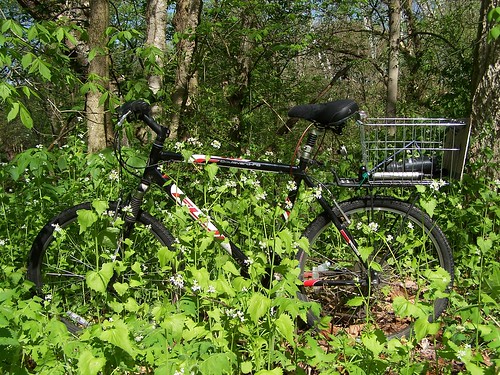[A reprint from a previous post, with updated numbers, in honor of the pending Earth Day. Thoughts on saving the planet AND saving money by cutting back on driving...]
On the actual Cost of Cars...
Owning a car cost (on average) $8,588 per a year in 2010 according to AAA. That's figuring in gas, repairs, insurance, car costs, etc.
AAA
This is up from $6,890/year on average (according to [a now missing] article back in 2004). Wow. Costs are rising quickly.
Here's a website that calculates your personal expenses - telling you how much you're paying a month for the privilege of owning a car and how much you'd be saving if you didn't have a car:
bikesatwork.com
And here's another that calculates your direct costs to drive a car along with your expenses occurred indirectly (accidents, road costs, pollutions costs, lost time costs, etc).
(This site includes the little factoid that, if I did NOT own a car and invested that savings instead - beginning at the age of 25 - that I could have saved $1 million + by retirement age. Or I could easily pay for my children to go to college.)
According to that last website, my wife and I are spending a little under $7,000/year for our car.
Let me go ahead and say $7,000 for the purpose of my following illustration.
Now, if we work 250 days (5 day workweek x 50 weeks) a year, that means we're paying $28/work day for owning a car (7000/250). That means, if you make $9/hour, you have to work 3 hours every day to pay for that car. if you make $14/hour, you're working 1 1/2 hours to pay for it.
I bring this up because I want to make the case for walking/biking/busing places instead of driving. Some people look at me and say, "You're spending 1 1/2 hours walking to work and back home! That's great if you can work it out, but how do you have the time to do so??!!"
The answer is, because I'm not working 1 1/2-2 hours to pay for a car. In fact, by the time you figure that if I drove, I'd be spending 1/2 hour to get to and from work, then I'm coming out with at least 1/2 hour MORE free time than the person in my situation who drives. More still, if that person also later drives to a gym (where they pay MORE money) to exercise.
Want a million dollars? Want to pay for your kids' college? Want to SAVE time?
Sell that car. Or, at least consider it. It's not the time saver you might think it is. And for folk working at minimum wage (where paying for a car might take closer to HALF your workday!!), give it a serious consideration.
Or just take a walk or a bike ride for the sheer joy of it.
Happy Earth Day.
Tuesday, April 19, 2011
True Cost of Driving Cars
Subscribe to:
Post Comments (Atom)

3 comments:
Not looking for confrontation here, but for suggestions. I'd be perfectly happy to eliminate or at least drastically reduce my auto use. However, my job is 50 miles from my home. (The nearest grocery store is 5 miles from my home.) Since jobs are hard to come by in this tough economy and riding for more than 3 hours (one way) to work (I've looked into it because I really am interested in getting away from the car) is prohibitive. I'd be looking at more than 6 hours a day going to and from work. What would you recommend?
We all make decisions and often do so based upon our values. Certainly, feeding our family is a high value and one we all hold to rightly.
But beyond that, where do I live? one might ask themselves? Can I locate myself so that I am more likely to be able to find a job in walking distance? In biking distance? In mass transit distance?
If shedding a car is a high value and becoming less dependent upon the expense and moral consequences, one would arrange their lives to that end.
Of course, there are other competing values. Do I need to be near aging parents who are remote? Can they move closer or is that not an option?
If we as individuals and society place greater value on energy and auto independence, we make changes in our personal and societal lives. Placing a high value on having personal autos has resulted in more sprawl, which, in turn reinforces the need for cars.
Not everyone is set up to use the car less. Where it is a high enough value, we can try to change our lives, but there are always competing values.
Not much help, huh?
Beyond that unhelpful answer, what "they" say is: Begin where you can begin.
If you can't bike (walk, mass transit) to work, can you bike to church? To the store? To visit friends/family? For other errands?
Can you mass transit part or drive part of the way and walk/bike another part? Can you drive 20 miles to the nearest bus stop and bus the rest of the way in?
Not everyone has lives that are conducive to getting rid of vehicles. If that's a high value, then folk change their lives to make it possible. If it's not possible, then folk begin by reducing where they can.
If that's any help.
Ultimately, if someone needs/wants to - for whatever reason - live on a deserted island and discover the only way to get to their job and to a grocery store is by helicopter, then they have to get there by helicopter - until such time as they decide they no longer need/want to live on a deserted island.
Post a Comment